Save the Adventure (3)
By:
October 3, 2013
The previous two posts looked at two different themes found in the Robinsonade-type adventure story: the DIY ethos, and un-alienated work. This post will look at a third key Robinsonade theme: the cozy catastrophe.
Thanks! To the nearly 400 adventure fans who kickstarted the SAVE THE ADVENTURE e-book club.
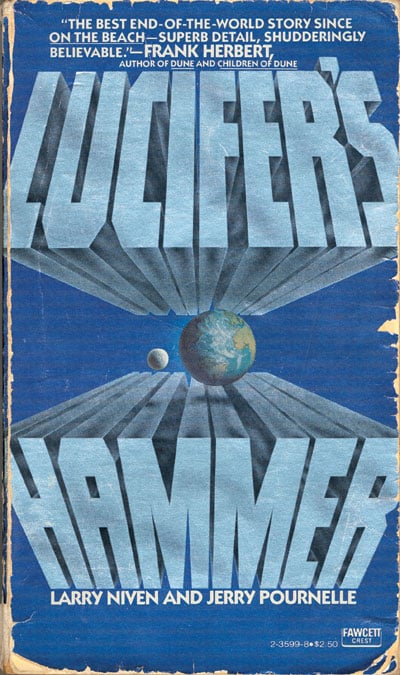
JOSH GLENN’S *BEST ADVENTURES* LISTS: BEST 250 ADVENTURES OF THE 20TH CENTURY | 100 BEST OUGHTS ADVENTURES | 100 BEST RADIUM AGE (PROTO-)SCI-FI ADVENTURES | 100 BEST TEENS ADVENTURES | 100 BEST TWENTIES ADVENTURES | 100 BEST THIRTIES ADVENTURES | 75 BEST GOLDEN AGE SCI-FI ADVENTURES | 100 BEST FORTIES ADVENTURES | 100 BEST FIFTIES ADVENTURES | 100 BEST SIXTIES ADVENTURES | 75 BEST NEW WAVE SCI FI ADVENTURES | 100 BEST SEVENTIES ADVENTURES | 100 BEST EIGHTIES ADVENTURES | 75 BEST DIAMOND AGE SCI-FI ADVENTURES | 100 BEST NINETIES ADVENTURES (in progress) | 1994 | 1995 | 1996 | 1997 | 1998 | 1999 | 2000 | 2001 | 2002 | 2003 | NOTES ON 21st-CENTURY ADVENTURES.
20 ADVENTURE THEMES AND MEMES: Index to All Adventure Lists | Introduction to Adventure Themes & Memes Series | Index to Entire Series | The Robinsonade (theme: DIY) | The Robinsonade (theme: Un-Alienated Work) | The Robinsonade (theme: Cozy Catastrophe) | The Argonautica (theme: All for One, One for All) | The Argonautica (theme: Crackerjacks) | The Argonautica (theme: Argonaut Folly) | The Argonautica (theme: Beautiful Losers) | The Treasure Hunt | The Frontier Epic | The Picaresque | The Avenger Drama (theme: Secret Identity) | The Avenger Drama (theme: Self-Liberation) | The Avenger Drama (theme: Reluctant Bad-Ass) | The Atavistic Epic | The Hide-And-Go-Seek Game (theme: Artful Dodger) | The Hide-And-Go-Seek Game (theme: Conspiracy Theory) | The Hide-And-Go-Seek Game (theme: Apophenia) | The Survival Epic | The Ruritanian Fantasy | The Escapade
A civilized person finds him- or herself alone, perhaps forever; s/he learns to survive by his/her wits, and ends up thriving. The alienation s/he experienced as a member of civilization’s lonely crowd is resolved; s/he is supremely content. Science fiction exegetes have an apt phrase describing this state of affairs: the cozy catastrophe. The invisible prison limned by this sort of Robinsonade is not merely civilization’s conveniences, or civilization’s wage slavery and meaningless work, but CIVILIZATION ITSELF.
Two notes: (1) Civilization doesn’t have to be destroyed in order for an adventure story’s theme to be the cozy catastrophe. (2) A post-apocalyptic scenario in which nothing is rebuilt is not a Robinsonade.
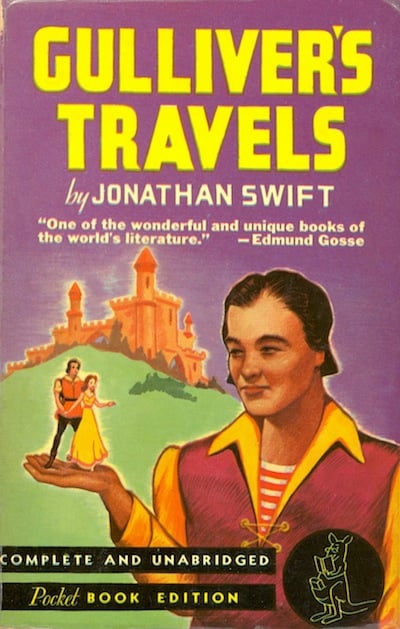
* Jonathan Swift’s Gulliver’s Travels (1726) is in certain respects a sardonic inversion of the Robinsonade. It is a satire on human nature and a parody of the “travellers’ tales” literary sub-genre. (Note that Robinson is the captain who invites Gulliver to serve as a surgeon aboard his ship.)
* The Female American; or, The Adventures of Unca Eliza Winkfield is a 1767 Robinsonade with a female protagonist.
* Frederick Marryat’s Masterman Ready, or the Wreck of the Pacific is an 1841 Robinsonade children’s novel. The book follows the adventures of the Seagrave family who are shipwrecked at sea, and survive on a desert island with the assistance of the titular veteran sailor.
* Scottish author R. M. Ballantyne’s 1858 novel The Coral Island: A Tale of the Pacific Ocean (1858) is a Robinsonade… and one of the first works of juvenile fiction to feature exclusively juvenile heroes.
* In Wilkie Collins’s 1868 novel Moonstone (not an adventure novel), one of the chief characters and narrators, the eccentric servant Gabriel Betteredge, uses Defoe’s book for bibliomantic purposes: “When my spirits are bad — Robinson Crusoe. When I want advice — Robinson Crusoe. In past times, when my wife plagued me; in present times, when I have had a drop too much — Robinson Crusoe. I have worn out six stout Robinson Crusoe’s with hard work in my service….” I suspect this is Collins’s way of poking fun at fans of the book?
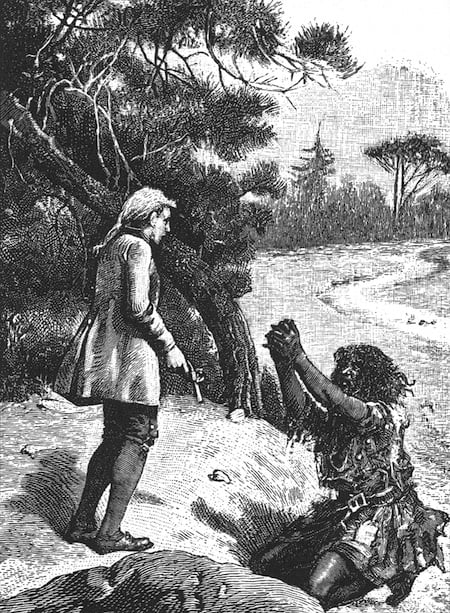
* Robert Louis Stevenson’s 1883 novel Treasure Island, though itself a classic adventure novel in the treasure-hunt sub-genre, features a castaway character — Ben Gunn — who is a parody of Robinson Crusoe.
* M.P. Shiel’s 1901 science fiction novel The Purple Cloud is a Robinsonade of sorts. The protagonist does demonstrate great ingenuity in the aftermath of a worldwide die-off. However, he also seems totally bonkers.
* The Admirable Crichton is a comic stage play written in 1902 by J. M. Barrie. I’d call it a sardonic inversion of the Robinsonade.
* Carol Ryrie Brink’s 1937 juvenile novel Baby Island is a Robinsonade of sorts.
* Michael Innes’s shipwreck/murder mystery Appleby on Ararat (1941). Sardonic inversion?
* George R. Stewart’s 1949 science fiction novel Earth Abides — and other post-apocalyptic novels in which mankind devolves and civilization collapses — has Robinsonesque elements, but they’re also sardonic inversions.
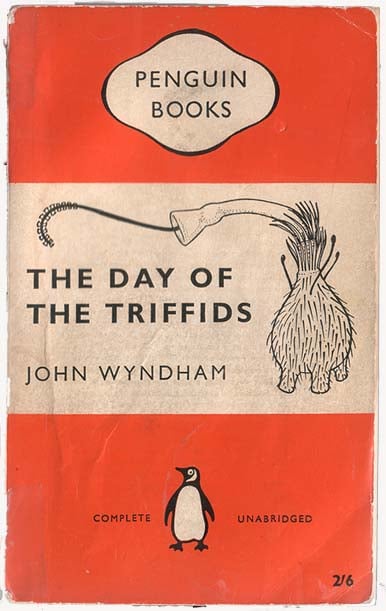
* John Wyndham’s 1951 science fiction novel The Day of the Triffids has some Robinsonade-esque qualities.
* William Golding’s Lord of the Flies (1954) is a sardonic inversion of the Robinsonade. A group of civilized boys is stranded on a desert island, and (SPOILER ALERT) they revert to savagery.
* William Golding’s 1956 novel Pincher Martin: The Two Deaths of Christopher Martin is another sardonic inversion of the Robinsonade by the same author. Its plot is very similar to that of the TV show LOST.
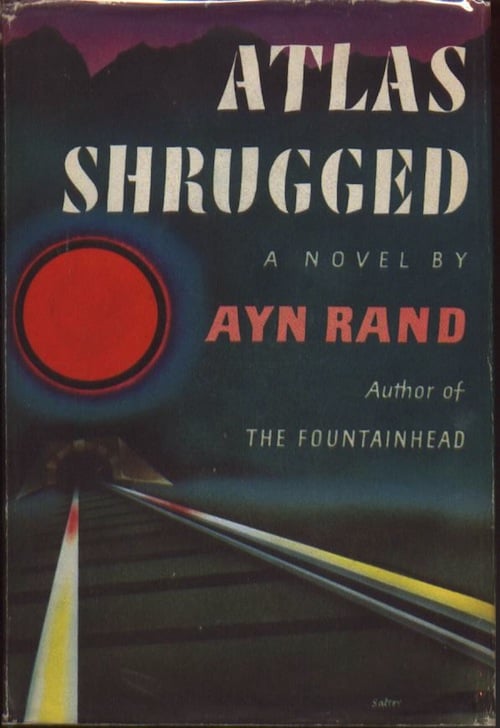
* Ayn Rand’s 1957 sci fi novel Atlas Shrugged. The ingenious twist being the fact that the rebuilders are the ones who — by seceding from a society they regard is irredeemable — cause the catastrophe!
* Muriel Spark’s 1958 novel Robinson is a sardonic inversion of the Robinsonade.
* Tom Godwin’s 1958 science fiction novel The Survivors is a Robinsonade — in space.
* Scott O’Dell’s 1960 YA novel Island of the Blue Dolphins is a Robinsonade.
* The Wind from Nowhere (1961) is the debut novel by J.G. Ballard. The novel was the first of a series of Ballard novels dealing with scenarios of natural disaster, in this case seeing civilization reduced to ruins by prolonged worldwide hurricane force winds.
* John Christopher’s 1964 novel Sweeney’s Island is a sardonic inversion of the Robinsonade.

* Edmund Cooper’s 1964 science fiction novel Transit is a Robinsonade… in space.
* The 1964–65 TV show Gilligan’s Island is a sardonic inversion of the Robinsonade, though we are asked to admire the professor’s ingenious inventions. Too bad that Gilligan always destroys them. Also: Should mention the 1965–68 TV show Lost in Space, about the Space Family Robinson… but I’m not sure it’s really a Robinsonade. PS: The show was inspired by a 1962 comic book series about the Space Family Robinson.
* Robert Heinlein’s 1964 science fiction novel Farnham’s Freehold is a Robinsonade of sorts.
* The 1964 sci-fi movie Robinson Crusoe on Mars is a Robinsonade… in space.
* Ronald Johnston’s 1965 thriller Danger at Bravo Key takes place on an uninhabited Caribbean island; yet there are plenty of supplies and ammunition and so forth. So to the extent that it’s about being stranded — it’s not really about that — it’s a cozy catastrophe.

* Some parts of John Christopher’s excellent YA Tripod series: The White Mountains (1967), The City of Gold and Lead (1968), and The Pool of Fire (1968).
* French author Michael Tournier’s 1967 novel Friday, or, The Other Island (Vendredi ou les Limbes du Pacifique) is a sardonic inversion of the Robinsonade — in which Crusoe’s ingenuity fails him, and he must learn from Friday how to live more in tune/touch with nature. PS: Tournier published a YA version of the same story in 1971.
* Troubles is a brilliant 1970 novel by J. G. Farrell. The plot concerns the dilapidation of a once grand Irish hotel in the midst of the political upheaval during the Irish War of Independence. It is the first installment in Farrell’s Empire Trilogy. Sardonic inversion of the cozy catastrophe?
* The Siege of Krishnapur is a brilliant 1973 novel by J. G. Farrell. It details the siege of a fictional Indian town during the Indian Rebellion of 1857 from the perspective of the British residents. It is the second installment in Farrell’s Empire Trilogy. Sardonic inversion of the cozy catastrophe?
* J.G. Ballard’s 1974 novel Concrete Island is a sardonic inversion of the Robinsonade.
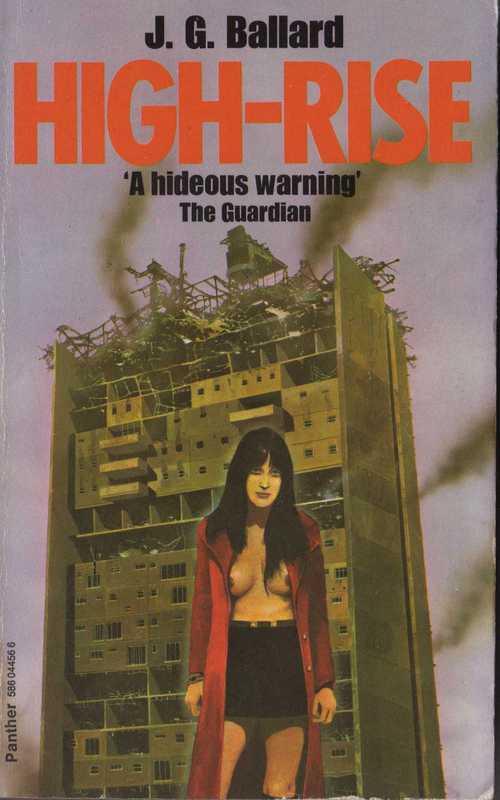
* J.G. Ballard’s 1975 novel High-Rise is a sardonic inversion of the Robinsonade. A luxury forty-storey apartment block in London which is in effect “a small vertical city” (p.9) forms “a virtually homogeneous collection of well-to-do professional people.” Gradually they stop leaving the block, social relations between different groups of tenants worsen, and eventually a “new order had emerged, in which all life within the high-rise revolved around three obsessions – security, food and sex.”
* O.T. Nelson’s libertarian YA novel The Girl Who Owned a City (1975) is a cozy catastrophe. And the building in which the protagonist and her comrades hole up is a kind of island (or gated community).
* Larry Niven and Jerry Pournelle’s Lucifer’s Hammer (1977) is a cozy catastrophe with certain Robinsonade-esque elements. The colony formed by certain survivors is a kind of island (or gated community).
* The Singapore Grip is a brilliant 1978 novel by J. G. Farrell. It relates the events following Japan’s entry into the Second World War by invading South East Asia and swiftly occupying Singapore. It is the third installment in Farrell’s Empire Trilogy. Sardonic inversion of the cozy catastrophe?
* Larry Niven and Jerry Pournelle’s Oath of Fealty (1981) is set in the kind of Robinson-ade like urban “island” that J.G. Ballard savagely satirizes. However, this is no satire.
* Paul Theroux’s 1981 novel The Mosquito Coast is a sardonic inversion of this sort of Robinsonade; the patriarch of a would-be Swiss Family Robinson tells his family that civilization has been destroyed — but it hasn’t.
* J.M. Coetzee’s 1986 novel Foe is a sardonic inversion of the Robinsonade.
* J.G. Ballard’s 1988 novel Running Wild is a sardonic inversion of the Robinsonade.

* Umberto Eco’s 1994 novel The Island of the Day Before is a sardonic inversion of the Robinsonade.
* J.G. Ballard’s 1996 novel Cocaine Nights is a sardonic inversion of the Robinsonade.
* J.G. Ballard’s 2000 novel Super-Cannes is a sardonic inversion of the Robinsonade.
* The 2000 film Castaway is a middlebrow Robinsonade.
* The 2004–2010 TV series LOST is… well, who knows what it is?
* Lemony Snicket’s 2006 YA novel The End (thirteenth and final novel in the series A Series of Unfortunate Events) satirizes — or pays ironic homage, perhaps — to the Robinsonade sub-genre.
20 ADVENTURE THEMES AND MEMES: Index to All Adventure Lists | Introduction to Adventure Themes & Memes Series | Index to Entire Series | The Robinsonade (theme: DIY) | The Robinsonade (theme: Un-Alienated Work) | The Robinsonade (theme: Cozy Catastrophe) | The Argonautica (theme: All for One, One for All) | The Argonautica (theme: Crackerjacks) | The Argonautica (theme: Argonaut Folly) | The Argonautica (theme: Beautiful Losers) | The Treasure Hunt | The Frontier Epic | The Picaresque | The Avenger Drama (theme: Secret Identity) | The Avenger Drama (theme: Self-Liberation) | The Avenger Drama (theme: Reluctant Bad-Ass) | The Atavistic Epic | The Hide-And-Go-Seek Game (theme: Artful Dodger) | The Hide-And-Go-Seek Game (theme: Conspiracy Theory) | The Hide-And-Go-Seek Game (theme: Apophenia) | The Survival Epic | The Ruritanian Fantasy | The Escapade
MORE FURSHLUGGINER THEORIES BY JOSH GLENN: TAKING THE MICKEY (series) | KLAATU YOU (series intro) | We Are Iron Man! | And We Lived Beneath the Waves | Is It A Chamber Pot? | I’d Like to Force the World to Sing | The Argonaut Folly | The Perfect Flâneur | The Twentieth Day of January | The Dark Side of Scrabble | The YHWH Virus | Boston (Stalker) Rock | The Sweetest Hangover | The Vibe of Dr. Strange | CONVOY YOUR ENTHUSIASM (series intro) | Tyger! Tyger! | Star Wars Semiotics | The Original Stooge | Fake Authenticity | Camp, Kitsch & Cheese | Stallone vs. Eros | The UNCLE Hypothesis | Icon Game | Meet the Semionauts | The Abductive Method | Semionauts at Work | Origin of the Pogo | The Black Iron Prison | Blue Krishma! | Big Mal Lives! | Schmoozitsu | You Down with VCP? | Calvin Peeing Meme | Daniel Clowes: Against Groovy | The Zine Revolution (series) | Best Adventure Novels (series) | Debating in a Vacuum (notes on the Kirk-Spock-McCoy triad) | Pluperfect PDA (series) | Double Exposure (series) | Fitting Shoes (series) | Cthulhuwatch (series) | Shocking Blocking (series) | Quatschwatch (series) | Save the Adventure (series)
READ MORE essays by Joshua Glenn, originally published in: THE BAFFLER | BOSTON GLOBE IDEAS | BRAINIAC | CABINET | FEED | HERMENAUT | HILOBROW | HILOBROW: GENERATIONS | HILOBROW: RADIUM AGE SCIENCE FICTION | HILOBROW: SHOCKING BLOCKING | THE IDLER | IO9 | N+1 | NEW YORK TIMES BOOK REVIEW | SEMIONAUT | SLATE
